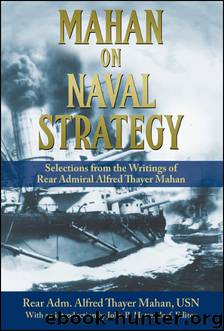Mahan on Naval Strategy by John Hattendorf

Author:John Hattendorf [Mahan, Alfred Thayer; Hattendorf, John B.]
Language: eng
Format: epub
ISBN: 9781612518190
Publisher: Naval Institute Press
The attempt of the Athenians, though overwhelmingly disastrous in this issue, was justified, because they were by far the superior naval power, and therefore had the probability of operating over a controlled sea.
The same cannot be said for Bonaparte’s Egyptian expedition of 1798.5 Without attempting to analyze the mingled motives which determined the action of the French general, it is probable that he was swayed largely by his disposition to trust to the chances of war, as he so often did both before and after, and, for long, not in vain. Also, when the expedition left Toulon, there were but three British ships-of-the-line in the Mediterranean, while even of their presence he may well have been ignorant. There was, therefore, a very reasonable preponderance of chances that the landing could be effected before an interrupting force could come up. Once on shore he was not wholly unjustified in relying for further progress upon the resources of the conquered country and upon his own unsurpassed powers for war and organization; and there seems reason to believe that, by adopting for the fleet a course analogous to that recommended by Hermocrates, he might greatly have increased the perplexities of the British admiral, and by so far his own chances of success.
His foot firmly planted in Egypt, Bonaparte, having compassed his first objective and so far accomplished his offensive purpose, necessarily passed, as to Great Britain, to the defensive with an inferior navy. This was precisely the position of Syracuse in relation to Athens, and the question may be considered, “What use should he have made of his fleet?” Having supreme command of it as well as of the army, this care was constantly in his mind. There were many considerations, political and administrative, that must justly have influenced him; but from the purely military point of view his decision appears to have been about the worst possible.
Good communication with home was the one thing necessary to his final success; nay, to the very existence of the French army in Egypt. There was no doubt of its ability to subdue Egyptian opposition; but it was bound to suffer losses by battle and disease, and if it advanced, as it must, there was further loss by unavoidable dissemination of forces. The numbers needed frequent reinforcement. Certain supplies also must come from home, such as ammunition of all kinds and equipments for war, not to speak of the moral effect upon the army of finding itself cut off from any probable hope of returning to France. There was, too, the possibility that the fleet, under favorable circumstances, might coöperate with the army; as, indeed, frigates did a few months later in the Syrian expedition.
The danger that threatened all this was the British fleet. No port nor number of ports along the line—as, for instance, Malta, which the French held—could keep communications open if that fleet were left untrammeled in its movements. It was now known to be in number approaching that of the French, although the French admiral continued in a state of blissful confidence about his power to resist it.
Download
This site does not store any files on its server. We only index and link to content provided by other sites. Please contact the content providers to delete copyright contents if any and email us, we'll remove relevant links or contents immediately.
| Automotive | Engineering |
| Transportation |
Whiskies Galore by Ian Buxton(42018)
Introduction to Aircraft Design (Cambridge Aerospace Series) by John P. Fielding(33133)
Small Unmanned Fixed-wing Aircraft Design by Andrew J. Keane Andras Sobester James P. Scanlan & András Sóbester & James P. Scanlan(32804)
Craft Beer for the Homebrewer by Michael Agnew(18248)
Turbulence by E. J. Noyes(8055)
The Complete Stick Figure Physics Tutorials by Allen Sarah(7375)
The Thirst by Nesbo Jo(6946)
Kaplan MCAT General Chemistry Review by Kaplan(6935)
Bad Blood by John Carreyrou(6624)
Modelling of Convective Heat and Mass Transfer in Rotating Flows by Igor V. Shevchuk(6443)
Learning SQL by Alan Beaulieu(6292)
Weapons of Math Destruction by Cathy O'Neil(6282)
Man-made Catastrophes and Risk Information Concealment by Dmitry Chernov & Didier Sornette(6022)
Digital Minimalism by Cal Newport;(5767)
Life 3.0: Being Human in the Age of Artificial Intelligence by Tegmark Max(5559)
iGen by Jean M. Twenge(5418)
Secrets of Antigravity Propulsion: Tesla, UFOs, and Classified Aerospace Technology by Ph.D. Paul A. Laviolette(5373)
Design of Trajectory Optimization Approach for Space Maneuver Vehicle Skip Entry Problems by Runqi Chai & Al Savvaris & Antonios Tsourdos & Senchun Chai(5070)
Pale Blue Dot by Carl Sagan(5012)
